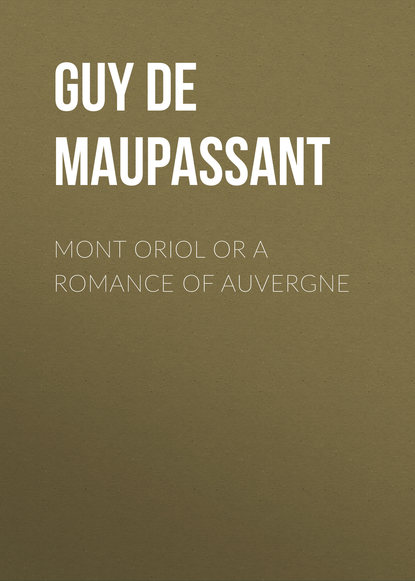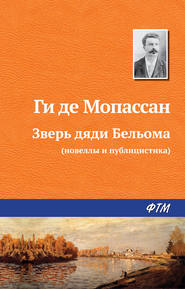По всем вопросам обращайтесь на: info@litportal.ru
(©) 2003-2024.
✖
Mont Oriol or A Romance of Auvergne
Настройки чтения
Размер шрифта
Высота строк
Поля
Christiane was thinking: "Here, then, is my husband!"
And she contemplated him, with eyes as astonished as if they were beholding him for the first, time. This was he, the man who ought to be, according to human ideas of religion, of society, the other half of her – more than that, her master, the master of her days and of her nights, of her heart and of her body! She felt almost a desire to smile, so strange did this appear to her at the moment, for between her and him no bond could ever exist, none of those bonds alas! so quickly broken, but which seem eternal, ineffably sweet, almost divine.
No remorse even came to her for having deceived him, for having betrayed him. She was surprised at this, and asked herself why it was. Why? No doubt, there was too great a difference between them, they were too far removed from one another, of races too widely dissimilar. He did not understand her at all; she did not understand him at all. And yet he was good, devoted, complaisant.
But only perhaps beings of the same shape, of the same nature, of the same moral essence can feel themselves attached to one another by the sacred bond of voluntary duty.
They dressed the baby again. William sat down.
"Listen, my darling," said he; "I don't venture to announce Doctor Black's visit to you, since you have been so nice toward myself. There is, however, one person whom I would very much like you to see – I mean Doctor Bonnefille."
Then, for the first time, she laughed, with a colorless sort of laugh, which fixed itself on her lips, without going near her heart; and she asked:
"Doctor Bonnefille! what a miracle! So then you are reconciled?"
"Why, yes! Listen! I am going to tell you, as a secret, a great bit of news. I have just bought up the old establishment. I have all the district now. Hey! what a victory. That poor Doctor Bonnefille knew it before anybody, be it understood. So then he has been sly. He came every day to obtain information as to how you were, leaving his card with a word of sympathy written on it. For my part, I responded to these advances with a single visit; and at present we are on excellent terms."
"Let him come," said Christiane, "whenever he likes. I will be glad to see him."
"Good. Thank you. I'll bring him here to you tomorrow morning. I need scarcely tell you that Paul is constantly asking me to convey to you a thousand compliments from him, and he inquires a great deal about the little one. He is very anxious to see her."
In spite of her resolutions she felt a sense of oppression. She was able, however, to say: "You will thank him on my behalf."
Andermatt rejoined: "He was very uneasy to learn whether you had been told about his intended marriage. I informed him that you had; then he asked me several times what you thought about it."
She exerted her strength to the utmost, and felt able to murmur: "You will tell him that I entirely approve of it."
William, with cruel persistency, went on: "He wishes also to know for certain what name you mean to call your daughter. I told him we were hesitating between Marguerite and Genevieve."
"I have changed my mind," said she. "I intend to call her Arlette."
Formerly, in the early days of her pregnancy, she had discussed with Paul the name which they ought to select whether for a son or for a daughter; and for a daughter they had remained undecided between Genevieve and Marguerite. She no longer wanted these two names.
William repeated: "Arlette! Arlette! That's a very nice name – you are right. For my part, I would have liked to call her Christiane, like you. I adore that name – Christiane!"
She sighed deeply: "Oh! it forebodes too much suffering to bear the name of the Crucified."
He reddened, never having dreamed of this comparison, and rising up: "Besides, Arlette is very nice. By-bye, my darling."
As soon as he had left the room, she called the wet-nurse, and directed her for the future to place the cradle beside the bed.
When the little couch in the form of a wherry, always rocking, and carrying its white curtain like a sail on its mast of twisted copper, had been rolled close to the big bed, Christiane stretched out her hand to the sleeping infant, and she said in a very hushed voice: "Go by-bye, my baby! You will never find anyone who will love you as much as I."
She passed the next few days in a state of tranquil melancholy, thinking a great deal, building up within herself a resisting soul, an energetic heart, in order to resume her life again in a few weeks. Her chief occupation now consisted in gazing into the eyes of her child, seeking to surprise in them a first look, but only seeing there two little bluish caverns invariably turned toward the sunlight coming in through the window.
And she experienced a feeling of profound sadness as she reflected that these eyes now closed in sleep would look out on the world, as she herself had looked on it, through the illusion of those secret dreamings which make the souls of young women trustful and joyous. They would love all that she had loved, the beautiful bright days, the flowers, the wood, and alas! living beings too! They would, no doubt, love a man! They would carry in their depths his image, well known, cherished, would see it when he would be far away, would be inflamed on seeing him again. And then – and then they would learn to weep! Tears, horrible tears, would flow over these little cheeks. And the frightful sufferings of love betrayed would render them unrecognizable, those poor wandering eyes which would be blue.
And she wildly embraced the child, saying to it: "Love me alone, my child!"
At length, one day, Professor Mas-Roussel, who came every morning to see her, declared: "You can soon get up for a little, Madame."
Andermatt, when the physician had left, said to his wife: "It is very unfortunate that you are not quite well, for we have a very interesting experiment to-day at the establishment. Doctor Latonne has performed a real miracle with Père Clovis by subjecting him to his system of self-moving gymnastics. Just imagine! This old vagabond is now able to walk as well as anyone. The progress of the cure, moreover, is manifest after each exhibition!"
To please him, she asked: "And are you going to have a public exhibition?"
"Yes, and no. We are having an exhibition before the medical men and a few friends."
"At what hour?"
"Three o'clock."
"Will M. Bretigny be there?"
"Yes, yes. He promised me that he would come to it. From a medical point of view, it is exceedingly curious."
"Well," she said, "as I'll just have risen myself at that time, you will ask M. Bretigny to come and see me. He will keep me company while you are looking at the experiment."
"Yes, my darling."
"You won't forget?"
"No, no. Make your mind easy."
And he went off in search of those who were to witness the exhibition.
After having been imposed upon by the Oriols at the time of the first treatment of the paralytic, he had in his turn imposed upon the credulity of invalids – so easy to get the better of, when it is a question of curing. And now he imposed upon himself with the farce of this cure, talking about it so frequently, with so much ardor and such an air of conviction that it would have been hard to determine whether he believed or disbelieved in it.
About three o'clock, all the persons whom he had induced to attend found themselves gathered together before the door of the establishment, expecting Père Clovis's arrival. He made his appearance, leaning on two walking-sticks, always dragging his legs after him, and bowing politely to everyone as he passed.
The two Oriols followed him, together with the two young girls. Paul and Gontran accompanied their intended wives.
In the great hall where the articulated instruments were fixed, Doctor Latonne was waiting, and killed time by chatting with Andermatt and Doctor Honorat.
When he saw Père Clovis, a smile of delight passed over his clean-shaven lips. He asked: "Well! how are we going on to-day?"
"Oh! all right, all right."
Petrus Martel and Saint Landri presented themselves. They wanted to satisfy their minds. The first believed; the second doubted. Behind them, people saw with astonishment Doctor Bonnefille coming up, saluting his rival, and extending his hand toward Andermatt. Doctor Black was the last to arrive.
"Well, Messieurs and Mesdemoiselles," said Doctor Latonne, as he bowed to Louise and Charlotte Oriol, "you are going to witness a very curious phenomenon. Observe first, before the experiment, this worthy fellow walking a little, but very little. Can you walk without your sticks, Père Clovis?"
"Oh! no, Mochieu!"
"Good, then let us begin."
The old fellow was hoisted on the armchair; his legs were strapped to the movable feet of the sitting-machine; then, at the command of the inspector: "Go quietly!" the attendant, with bare arms, turned the handle.
Thereupon, the right knee of the vagabond was seen rising up, stretching out, bending, then moving forward again; after that, the left knee did the same; and Père Clovis, seized with a sudden delight, began to laugh, while he repeated with his head and his long, white beard all the movements imposed on his legs.

















